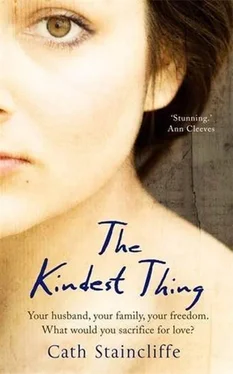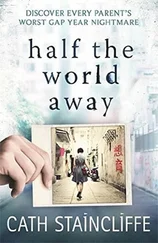‘Move in with me,’ he said.
‘What?’
‘Or I’ll move in here. I don’t want anyone else.’ He edged himself up onto his elbows, shook his hair back from his face. ‘I don’t want to share you.’ His eyes were hot.
‘Very bourgeois.’
‘Deborah,’ he warned me, his grip on my wrist tightening.
‘Okay.’
He closed his eyes, a gesture of relief. Then looked at me again. Lay back down. I began to unbuckle his belt.
Living together. Monogamy. I wondered how long it would last.
We argued about housework: cleaning, shopping, cooking, washing. He tried to joke about it but I was deadly serious. There was no way I was going to become my mother; solely responsible for all that – even before my dad died. Life was too short and chores too soul-destroying. Neil was an adult, not a child, and I appealed to his political sensibility. ‘You believe in equality – this is part of the equation.’ I had little respect for a man who needed servicing. It worked both ways: I would shift rubbish and change fuses with the best of them. Not for me the helpless act, the little lady who hauls home the groceries then finds her muscles have melted clean away when faced with a flagstone.
Things weren’t up to scratch for a long time but I’d seen my brother successfully use the excuse of incompetence to get away with doing nothing in the house so that wouldn’t wash. We taught each other and weathered the ridicule of friends and family: You the one wearing the apron, Neil?
He became competent at cooking and cleaning and laundry. No more than that, but no more was expected. And I became a dab hand at DIY.
The prison van comes for us at eight in the morning. We’ve eaten breakfast and are waiting in the reception area near the main exit. Four of us. A couple of the girls, who don’t look much older than Sophie, are smoking and laughing, their nerves making them talk quickly. The other woman is silent. She wears Asian dress, a salwar kameez in a pale green. There’s grey in her hair. I wonder what she’s charged with.
The van is the sort you’ve seen countless times on television. Rectangular and white with the row of distinctive small windows. Any high-profile case and the news shows the van swinging towards the court and photographers running along, arms upstretched, cameras held to the windows, hoping for that lucky snap. I wonder whether anyone will greet my arrival. It’s likely. The case, the ins and outs and the moral twists, have fed the papers and the discussion programmes for weeks. It appears mine is a cause célèbre . Not what we intended at all.
We climb into the van up metal steps located just behind the driver’s cabin. The narrow corridor is lined with doors, a little cubicle each. Bare metal walls, a reinforced galvanized-mesh seat. The guard sends me into the first and locks me in. It is April and all I can see out of the little glass window is bleak grey sky. Nine months I’ve been in prison.
The journey takes about twenty minutes. Styal is a few miles south of the city centre. Before all this, it was somewhere we came walking, a place with woods and a river, an old mill and tea rooms. Where the kids played Pooh-sticks and Adam got stuck on a tree over the river and had to be rescued. Where Sophie got stung by a wasp and her ear puffed up and we worried it was an allergic reaction. The prison is less than a mile away from the country park.
Will they be there? Sophie? Adam? At Adam’s last visit, I told him it didn’t matter. That it would be horrible for all of us and I’d understand if he stayed away. I haven’t seen Sophie. She’s staying with Michael and Veronica.
Adam’s looking after our house. That might be too strong a phrase. I expect he’s treating it with benign neglect at best. If he’s off the rails again, who knows? He might have trashed the place and sold the lead from the roof.
When I was first arrested Jane asked Adam if he wanted to move in with her. There’s a box room in her flat he could squeeze into but he was happier at home. I asked him, too, just in case he was acting out of misplaced politeness. But he was quite clear: ‘Jane’s great, but move in? No way. I couldn’t relax, you know?’
I nodded, picturing Adam sprawled on the couch, a game on the screen, dirty plates and discarded items of clothing strewn about. I’m glad he’s comfortable at home, that there’s some remnant of our family still there, that the house is not deserted. Jane keeps in touch with him; he can call her if need be. Adam likes Jane. I love her. She has been a constant for me, from those undergraduate days till now. A fast friend, someone I’ve shared my life with.
The vehicle speeds up and there are shouts outside, then a hard thump on the side. For me? For one of the others? Then we swing to the left and the van slows, the engine stops. We must be at the court. A ripple of panic courses through me. My skin chills but blood runs hot in my limbs. There’s a rushing noise in my ears. The guard unlocks the door and leads us down the steps and into the holding area beneath the courts.
I don’t want to be here. Anywhere else but here.
The summer of my graduation we went island-hopping in Greece. I’d studied photography at uni but, as the course went on, found myself less and less interested in the act of taking photographs and more and more fascinated with creating material to photograph. Concentrating on still life and found objects, I would spend weeks building up an environment or a collection of items or a scenario complete with figures, maybe a sense of narrative. The photographs became a way of documenting the creative process. Drawn to different themes and cultures, I researched avidly, reading everything I could find on Mexican and Aztec culture for a project entitled ‘Day of the Dead’ or experimenting with early dyeing techniques for a photo-essay on colour. Using my own urine to set dyes was one of the more scandalous elements of my second-year project.
Graduating with a 2:2, I knew I didn’t want to work as a photographer. Perhaps I should have considered animation, though my drawing skills were average at best, or becoming a stylist, but at the start of the eighties there were precious few jobs for arts graduates.
Neil, who’d finished a year ahead of me, had gone on to do a teacher-training course. Jobs in history weren’t ten a penny either. By rights he should have started a teaching job that September. But I’d talked him into our Greek trip. We both worked for a temp agency through July and August to raise the money, then had two months away.
We arrived in Athens in the middle of the night. The air was hot and full of dust, which left our skin feeling gritty.
There was no bus to the port at Piraeus till dawn so we sat in the scrub on the airport approach road waiting for sunrise. At one point a car drew up, airport security, and a man in a crisp uniform and peaked cap harangued us until we got up and dragged our rucksacks back to the building. There was nowhere to sit and nothing to eat or drink.
When the bus came we repeated the word ‘Piraeus’ to the driver, who took some drachmas and motioned us down the aisle. The front windows were framed with coloured fringing and sprigs of plastic flowers. Central on the dashboard stood a large plastic glow-in-the-dark Madonna, and rosary beads dangled from the rear-view mirror.
‘My mother’d love it,’ Neil murmured.
The bus juddered its way along winding roads and through the crowded jumble of the city, the muddle of apartments, small shops and businesses, to the port. When we got off, the place was quiet. Nothing open. I wondered where all the fishermen were. Hunger and lack of sleep were making me grumpy but then a corner shutter rose and a small, round, wrinkled man plonked a table and two chairs outside. We made our way over and stepped inside. There was a garish menu with photos of sickly-looking food. I pointed to a cheese roll, treacle cake, coffee. Neil nodded for the same. We ate outside at the rickety table and watched the gulls swerving down for debris on the quayside. The day was already warm and the food set me right. The sea was a pure deep blue and I took a long breath of air and watched Neil. Early on, I often feared he would leave me. That was what men did. I hid it well. He never realized. Of course, I imagined he’d betray me for another woman. Instead it was neurones crumbling and muscles wasting away that stole him from me.
Читать дальше












